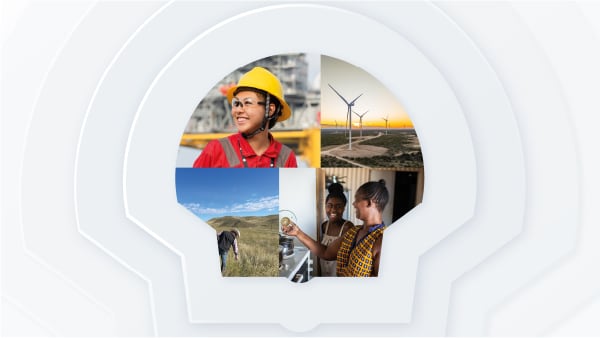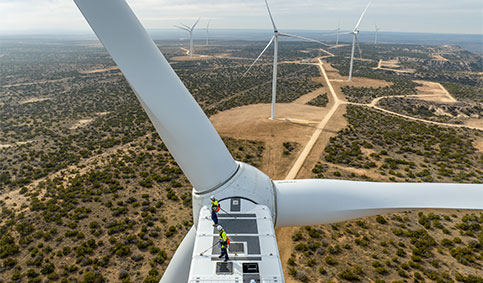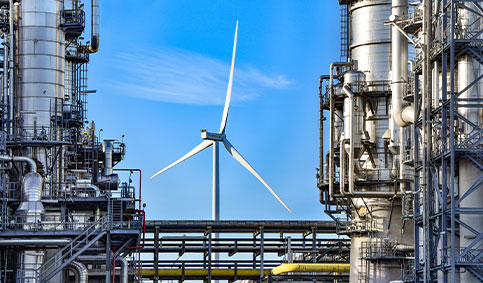Addressing misalignment
In last year’s report, we found some misalignment with 10 associations:
- American Petroleum Institute (API)
- Australian Energy Producers (AEP, formerly Australian Petroleum Production & Exploration Association)
- Canadian Association of Petroleum Producers (CAPP)
- Chamber of Minerals and Energy of Western Australia (CME)
- International Gas Union (IGU)
- National Association of Manufacturers (NAM)
- Queensland Resources Council (QRC)
- Texas Oil & Gas Association (TXOGA)
- U.S. Chamber of Commerce (USCC)
- Western States Petroleum Association (WSPA)
We ended our membership of QRC in September 2023. After careful consideration of our membership and noting we have assets spanning Australia, we decided to focus our advocacy efforts through organisations that have a national footprint in Australia, such as Australian Energy Producers (formerly APPEA).
Through our internal process for reviewing issues of misalignment, we decided to remain members of the other nine associations at the current time. For most of these associations, there is evidence that their positions are changing, and we believe we can have a greater impact within the associations than outside them, through regular engagement. In the sections below, we provide an update on our engagements with the nine associations since our last report. This update focuses on the misalignment we identified in our last detailed review. This two-year reporting cycle is in line with our principles for participation in industry associations.
American Petroleum Institute (API), National Association of Manufacturers (NAM) and U.S. Chamber of Commerce (USCC)
We found ongoing misalignment with API, NAM and USCC in the assessments we published in 2019, 2021 and 2023. Since our last report, we have engaged with these associations in the USA to seek changes in their positions where we found misalignment.
We encouraged the associations to explicitly state their support for net-zero emissions by 2050 and to advocate in support of the USA’s net-zero emissions by 2050 target. While the organisations have stated their support for the Paris Agreement and have referenced net-zero emissions by 2050 in their communications, they have not explicitly stated support for net-zero emissions by 2050.
We recognise that there are no current federal carbon pricing proposals in the USA. However, we believe it is important to continue to advocate on this key topic. We have been encouraged by API’s ongoing support of carbon pricing. We note that NAM and USCC have not changed their positions to explicitly support carbon pricing, though they continue to state support for market-based approaches. We will continue to encourage NAM and USCC to support carbon pricing.
API, NAM and USCC have stated support for reducing methane emissions, and API and USCC have stated support for the direct regulation of methane emissions. We have encouraged the associations to also state support for ending routine flaring by 2030 or sooner, but they have not yet done so.[1]
We will engage with these associations on our updated positions on climate and energy transition and will be transparent about where we find differences.
Texas Oil & Gas Association (TXOGA)
We have engaged with TXOGA on the findings of our previous report.
We asked TXOGA to update its climate statement to state support for net-zero emissions by 2050 and to publicly advocate reductions in carbon emissions. TXOGA has not updated its climate statement. TXOGA has advised us that it views the USA’s net-zero 2050 target as a federal-level issue rather than a state-level one.
We also encouraged TXOGA to take action in other areas, including being more transparent about its advocacy in relation to CCS, hydrogen and energy efficiency.
We welcomed TXOGA’s efforts to develop a CCS Bill for the 2023 Texas state legislative session. The bill addressed the key CCS issues that we had raised with TXOGA, including long-term liability and ownership of the pore spaces where carbon is stored. The bill did not pass, but we are working with TXOGA to reintroduce the bill for the 2025 legislative session. TXOGA has also provided some information about its CCS advocacy on its website.[2]
We welcomed TXOGA’s advocacy in support of a state hydrogen bill. The bill, which passed, places jurisdiction for the pipeline transportation and underground storage of hydrogen with the Railroad Commission of Texas. The bill also establishes the Hydrogen Policy Council, which is intended to study the development of the state’s hydrogen industry, development of a hydrogen hub, and appropriate oversight of production, pipeline transportation, and underground storage of hydrogen.
TXOGA has also played an important role in helping to ensure that legislators consider the impact of energy costs on consumers when developing regulations to reform the state’s electricity market.[3]
We continue to believe there is an opportunity for TXOGA to engage more actively on policies relating to the energy transition. We will engage with TXOGA on our updated positions on climate and energy transition and will be transparent about where we find differences.
Western States Petroleum Association (WSPA)
We have engaged with WSPA on the findings of our previous report. We are pleased to note progress in a number of areas.
We asked WSPA to explicitly state support for net-zero emissions by 2050, and in California to continue to work constructively with policymakers towards a robust and feasible plan that is sensitive to low-income and under-represented communities while helping achieve the state’s goal of net zero by 2045. Although WSPA has not explicitly stated support for net-zero emissions by 2050, it has engaged more constructively in helping to define pathways to meet California’s net-zero target. In particular, WSPA was the main sponsor of Stanford University’s study “Pathways to Carbon Neutrality” that aimed to provide an independent assessment of decarbonisation options and alternatives for California.[4] WSPA advised us that it briefed the California Air Resources Board on the study findings. WSPA also launched a media outreach programme in 2023 to increase public engagement in the state’s energy policy debate.[5]
We encouraged WSPA to continue to work with policymakers towards a robust and feasible plan to help achieve California’s target that all passenger vehicles sold in the state be zero-emissions by 2035, delivering a plan that is also sensitive to low-income and under-represented communities. While we support California’s aspiration, we share WSPA’s concerns about the feasibility of the plan to achieve it and some of the associated proposals. We think there needs to be a more comprehensive plan to expand the infrastructure needed to meet the target. We believe that WSPA has engaged more constructively on this topic in its policy discussions over the past year.
We were pleased to see WSPA publish information about its work to reduce methane emissions and its support for nature-based carbon removals.[6] We also encouraged WSPA to support policies to ensure that nature-based solutions complement, and do not displace, efforts to avoid and reduce greenhouse gas emissions; however, it has not yet done so.
We will engage with WSPA on our updated positions on climate and energy transition and will be transparent about where we find differences.
Australian Energy Producers (AEP)
Australian Petroleum Production & Exploration Association (APPEA) changed its name to Australian Energy Producers (AEP) in September 2023, to reflect its expanded focus beyond oil and gas to also cover low-carbon fuels and net-zero technologies.[7]
We have engaged with AEP on the findings of our previous report.
We encouraged AEP to continue to support reducing methane emissions throughout the natural gas supply chain, including supporting direct regulations for methane reduction and ending routine flaring by 2030 or sooner. AEP has established a methane working group, of which Shell is a member, which is working on a number of initiatives.
We will engage with AEP on our updated positions on climate and energy transition and will be transparent about where we find differences.
Chamber of Minerals and Energy Western Australia (CME)
We have engaged with CME on the findings of our previous report.
We have encouraged CME to support reducing methane emissions throughout the natural gas supply chain through direct regulations for methane reduction and ending routine flaring by 2030 or sooner. CME did not publish statements in 2023 in relation to reducing methane emissions. CME has advised us that reducing methane emissions is on its list of priority topics for 2024 and has invited Shell to provide a briefing on the topic for members in the coming months.
We will engage with CME on our updated positions on climate and energy transition and will be transparent about where we find differences.
Canadian Association of Petroleum Producers (CAPP)
We have engaged with CAPP on the findings of our previous report.
We asked CAPP to support ending routine flaring by 2030 or sooner. CAPP has not stated a public position in support of this to date.
We also encouraged CAPP to provide information about its support for accelerating electrification with renewable and low-carbon power sources. In its submission on Canada’s draft Clean Electricity Regulations, CAPP noted the role for electrification in reducing economy-wide emissions and those from the upstream oil and gas sector.[8] CAPP has not, however, explicitly stated support for accelerating electrification using renewable and low-carbon power sources.
We encouraged CAPP to state a position to ensure that nature-based solutions complement, and do not displace, efforts to avoid and reduce greenhouse gas emissions. While CAPP has stated support for “international and domestic offsets including those from nature”,[9] it has not yet stated a position on the emissions mitigation hierarchy.
We also encouraged CAPP to take several other actions, including in relation to positions on decarbonised hydrogen and environmental, social and governance (ESG) reporting, but no change has been observed.
We will engage with CAPP on our updated positions on climate and energy transition and will be transparent about where we find differences.
International Gas Union (IGU)
We have engaged with IGU on the findings of our previous report.
IGU has restarted its methane working group. We have encouraged IGU to state support for reducing methane emissions throughout the natural gas supply chain through direct regulations for methane reduction and ending routine flaring by 2030 or sooner. IGU is a member of the Methane Guiding Principles, which include the commitment to “advocate sound policy and regulations on methane emissions”.[10] IGU has not publicly stated positions specifically in support of the direct regulation of methane emissions or ending routine flaring by 2030 or sooner.
We encouraged IGU to explicitly state support for net-zero emissions by 2050, but it has not yet done so.
We will engage with IGU on our updated positions on climate and energy transition and will be transparent about where we find differences.
[1] We note that API has stated that it “supports company efforts toward no routine flaring by a date certain, for example the World Bank’s Zero Flaring Initiative by 2030”. See API Climate Action Framework: www.api.org/-/media/Files/EHS/climate-change/2021/api-climate-action-framework.pdf
[2] www.txoga.org/legislature-eyes-carbon-capture-storage-proposals/ and www.txoga.org/2023eeir/
[3] www.txoga.org/txoga-statement-on-bates-white-assessment/
[4] sccs.stanford.edu/california-projects/pathways-carbon-neutrality-california
[5] www.wspa.org/resource/levanta-tu-voz-its-time-for-everyone-to-raise-their-voice/
[6] www.wspa.org/resource/understanding-methanes-impact-on-climate-change-and-efforts-to-reduce-its-emissions-in-californias-oil-and-gas-industry/ and www.wspa.org/resource/the-critical-role-of-diverse-carbon-removal-solutions-in-climate-action/
[7] energyproducers.au/all_news/media-release-australian-energy-producers-revealed-as-new-name-for-appea/
[8] www.capp.ca/wp-content/uploads/2024/03/Letter_to_Minister_Guilbeaut_Re_Canada_Gazette__Part_I__August_10__2203__Clean_Electricity_Regulations.pdf
[9] www.capp.ca/en/our-priorities/climate-emissions/climate-positions/
[10] methaneguidingprinciples.org/about/ and methaneguidingprinciples.org/about/the-methane-guiding-principles/









